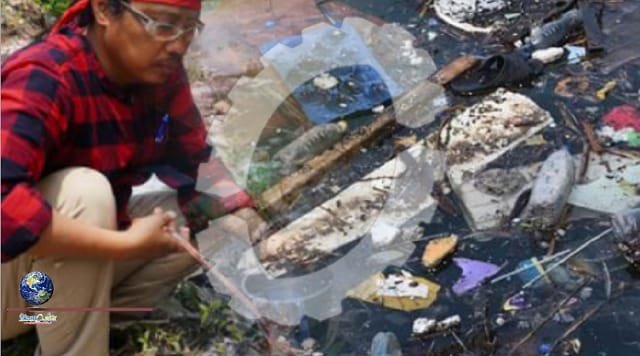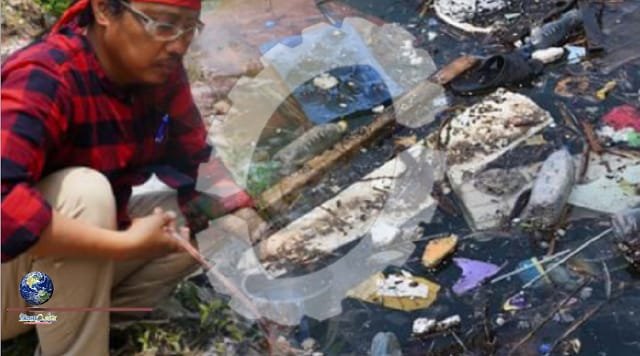An NGO studying the health of waterways in Indonesia has found that the Ciliwung, the main river which flows through Jakarta on densely populated Java Island, is badly contaminated with small particles of plastic – or micro-plastics – threatening human health and aquatic life.

Prigi Arisandi, executive director of Ecological Observation and Wetlands Conservation (Ecoton), said his group and others collaborated to research the health of the Ciliwung. Those efforts revealed that garbage bags, straws and plastic along with organic waste polluted the river, along with micro-plastics that had drifted from upstream Bogor.
“Micro-plastics attack respiratory systems and triggers the death of fish,” Prigi said, noting that testing showed as many as 268 particles in 100 liters of water. “Those fish are the people’s food source.”
The Ciliwung probe follows a 2021 expedition by Ecoton to the Brantas, Bengawan Solo and Citarum rivers in the provinces of East Java, Central Java and West Java, respectively. It found that their health was harmed by pollution from industries located along their banks.
The Brantas – the longest river in East Java – is dotted by mills run by sugar and paper companies, while textile factories operate along the other two rivers.
Some regional drinking water companies use river water as raw material for their end products, Prigi said. “The rivers in Java are ailing, they’re not fine,” Prigi said, adding that about 2.6 million tons of plastic waste are dumped into the rivers.
Rahyang Nusantara, co-coordinator of the Zero Waste Indonesia Alliance, said some bottled water also contains micro-plastics.
Prigi said the research is part of an effort by the Nusantara River Expedition (ESN) to record the health of 68 rivers in Indonesia. Expedition teams are expected to spend another year conducting similar research in Sumatra, Kalimantan, Sulawesi, Maluku, Papua, Nusa Tenggara and Bali.
Workers remove wood and plastic waste items from a river in Jakarta on April 22, 2020 – otherwise known as Earth Day around the world. [AFP]
The largest environmental advocacy NGO in Indonesia, Walhi, said rivers around the capital are polluted with 300 to 400 tons of waste a day including disposable diapers, organic waste, glass, metal, plastic bottles and plastic packaging. About 34 percent of that waste flows into Cilwung and the rest into other rivers.
Suci Fitriah Tanjung, the executive director of Walhi’s Jakarta’s chapter, said proper waste management could have a positive effect for the region, noting the rivers could be used as sources of drinking water.
“There would be no water crisis in Jakarta. The supply of drinking water is only 4 percent from Jakarta currently, the rest comes from outside,” she said.
Earlier this month, environmentalists demonstrated outside Malang City Hall in East Java province to call for a regional regulation banning single-use plastics such as bottles and other containers.
Alaika Rahmatullah, a researcher with Environmental Green Society, discussed how micro-plastics have been found in the Brantas River as well, according to an Ecoton news release.
“These are dangerous particles because they contain toxic compounds. When the toxic compounds are consumed by organisms such as fish and shrimp which are then consumed by humans, they endanger humans themselves,” he said, adding the micro-plastics can be a source of cancer.
The city’s mayor, Sutiaji, already has taken steps to combat plastic waste, according to the news release. “We continue to control this plastic waste, while we are working on a regional regulation. So that with this regional regulation, it is hoped that there will be punishment and we can reinforce regulations regarding the use of single-use plastics and reducing plastic waste,” Sutiaji, who goes by one name, wrote in a letter to the community last year.
Source: This news is originally published by benarnewsl
